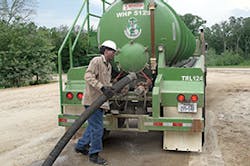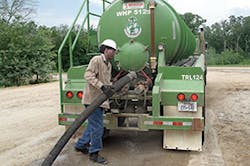FMCSA update
FEDERAL Motor Carrier Safety Administration (FMCSA) officials announced recently that no changes are needed in the regulatory guidance issued in 2012 on hours-of-service (HOS) requirements for oilfield operations. The statement came in response to public comments collected during listening sessions in Pennsylvania, Colorado, and Texas.
In short, the agency said the hours-of-service exceptions for oilfield operations apply only to very specific drivers operating specific types of equipment. The oilfield HOS exceptions do not apply to truck drivers making routine deliveries of sand, water, and other products to oilfield sites.
This is the most detailed FMCSA response to date on this issue. The rules in question are contained in Section 395.1(d) of 49 CFR and has been in effect in several iterations since the early 1960s. The rules provide two separate exceptions to the hours-of-service requirements, with two exceptions applying to different operators.
Section 395.1(d)(1) states that for drivers of commercial motor vehicles used exclusively in the transportation of oilfield equipment, including the stringing and picking up of pipe used in pipelines, and servicing of the field operations of the natural gas and oil industry, any period of eight consecutive days may end with the beginning of any off-duty period of 24 or more consecutive hours. This is commonly referred to as a “24-hour restart” of the 70 hours in eight days total on-duty time limit in Section 395.3(b).
Section 395.1(d)(2) states,Regulatory history
The history of the oilfield regulatory language makes it clear that Section 395.1(d)(2) was intended for use by persons who are primarily specialized equipment operators by who occasionally drive a CMV, as opposed to individuals whose primary job is to drive delivery vehicles, even if those vehicles might have simple modifications to help them make deliveries in rough oilfield terrain, FMCSA says.
FMCSA officials state that “contrary to the assertion of some commenters, there has been no ‘long standing’ interpretation that operators of water and sand trucks are eligible for the ‘waiting time’ provision.” Because interpretations of Section 395.1(d) did not specifically address the applicability of the waiting time provision to operators of vehicles such as sand and water delivery trucks, the states appear to have evolved inconsistent enforcement practices. In other cases, a lack of enforcement of the Section 395.1(d) provisions “may have given carriers and drivers the misimpression that their assumptions about applicability were accurate.”
FMCSA officials say they believe the 2012 amendment of the regulatory guidance has resolved most of the confusion regarding applicability of Section 395.1(d) to oilfield operations. While the guidance is consistent with the underlying regulations, the agency believes there are options available to the oil and natural gas industry that could be used to address any need to hours-of-service flexibility.
The rules offer procedures through which “persons or classes of persons may apply for an exemption from the HOS rules, among others, if the applicant can justify that operation under the proposed exemption would ‘…achieve a level of safety that is equivalent to, or greater than, the level of safety that would be obtained by complying with the regulations.”
Exemptions may be granted for a maximum two-year period and may be renewed. FMCSA officials emphasize that the exemption process is an effective means of addressing issues concerning specific motor carriers and, in some instances, segments of the industry. ♦

